

How Did Howard Rheingold Get So “Net Smart”?: An Interview. How Did Howard Rheingold Get So “Net Smart”: An Interview. Howard Rheingold has been one of the smartest, most forward thinking, most provocative writers about digital culture for the past several decades.

He’s someone who always makes me think. Even a short hall way chat with Howard at a conference can lead to transformative insights about how we live within a networked culture. I have been lucky to know him for more than two decades now, and I treasure every interaction I’ve ever had with the guy. Howard embodies the transition which Fred Turner has documented between the counterculture of the 1960s and the cyberculture of today: he has a quirky personality which reminds me of Frank Zappa or Leon Redbone, and, as this interview suggests, he still carries with him some of the core values he first articulated working for the Whole Earth Catalog.
So, it would be easy to see him as a voice from the past, but that would be a serious mistake, since he is still totally on top of the most recent developments in the field. Project Information Literacy: Smart Talks. 24/7 - a DIY Video Summit - Organizers. Friday Brain Food: Video Interview with Author and Futurist Howard Rheingold. Peter Rothman.
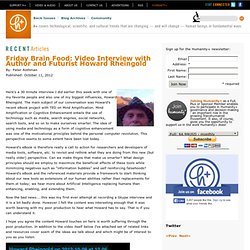
The Infotention Network. Infotention. Social Media Classroom. Paying Attention in an Information Rich World. Rheingold, H. (2012).
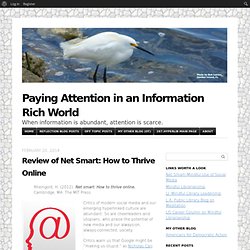
Net smart: How to thrive online. Cambridge, MA: The MIT Press. Critics of modern social media and our emerging hyperlinked culture are abundant. So are cheerleaders and utopians, who praise the potential of new media and our always-on, always-connected, society. Critics warn us that Google might be “making us stupid,” as Nicholas Carr put it. At the other extreme are the cheerleaders. New TED Book: Mind Amplifier. It’s a complaint we’ve all heard about the internet: all the cat videos and incessant celebrity gossip sites are making us, as a culture, stupider.
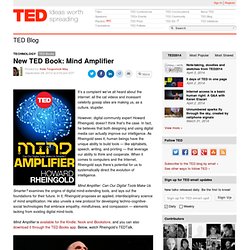
However, digital community expert Howard Rheingold, doesn’t think that’s the case. In fact, he believes that both designing and using digital media can actually improve our intelligence. Howard Rheingold on collaboration. Smart Mobs. Cooperation Commons. Curators Create Metadata For An Emerging Collective Intelligence. Douglas Engelbart’s Unfinished Revolution. Doug Engelbart knew that his obituaries would laud him as “Inventor of the Mouse.”
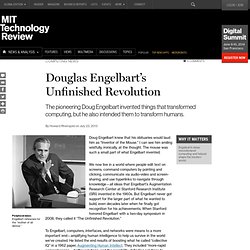
I can see him smiling wistfully, ironically, at the thought. The mouse was such a small part of what Engelbart invented. We now live in a world where people edit text on screens, command computers by pointing and clicking, communicate via audio-video and screen-sharing, and use hyperlinks to navigate through knowledge—all ideas that Engelbart’s Augmentation Research Center at Stanford Research Institute (SRI) invented in the 1960s. But Engelbart never got support for the larger part of what he wanted to build, even decades later when he finally got recognition for his achievements.
When Stanford honored Engelbart with a two-day symposium in 2008, they called it “The Unfinished Revolution.” Howard Rheingold on how the five web literacies are becoming essential survival skills. Howard Rheingold isn’t too concerned about whether Google is making us stupid or if Facebook is making us lonely.
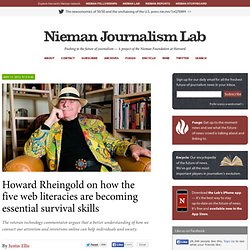
Those kind of criticisms, Rheingold says, miscalculate the ability humans have to change their behavior, particularly when it comes to how we use social media and the Internet more broadly. “If, like many others, you are concerned social media is making people and cultures shallow, I propose we teach more people how to swim and together explore the deeper end of the pool,” Rheingold said Thursday. Rheingold was visiting the MIT Media Lab to talk about his new book, Net Smart: How to Thrive Online, which examines how people can use the Internet not just to better themselves, but also society as a whole.
Rheingold has a longer online history than most, going back to The WELL, one of the first online forums back in the 1980s. Talking Digital Literacy with Howard Rheingold. Yesterday I attended an event with Howard Rheingold as the keynote speaker.
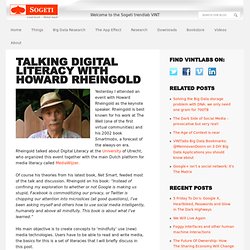
Rheingold is best known for his work at The Well (one of the first virtual communities) and his 2002 book Smartmobs, a forecast of the always-on era. Rheingold talked about Digital Literacy at the University of Utrecht, who organized this event together with the main Dutch platform for media literacy called MediaWijzer. Of course his theories from his latest book, Net Smart, feeded most of the talk and discussion. Rheingold on his book: “Instead of confining my exploration to whether or not Google is making us stupid, Facebook is commoditizing our privacy, or Twitter is chopping our attention into microslices (all good questions), I’ve been asking myself and others how to use social media intelligently, humanely and above all mindfully.
This book is about what I’ve learned.” His main objective is to create concepts to ‘mindfully’ use (new) media technologies. 5 literacies What about writing media? Howard Rheingold: Filtering – from Information Deluge to Context with JP Rangaswami. Howard Rheingold JP Rangaswami’s thoughtful series of blog posts on the why and how of filtering online info-flows is a fundamental infotention text.
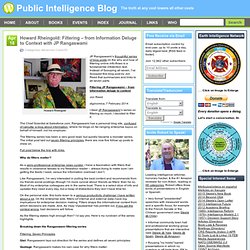
Instead of Scooping all seven, I’ve Scooped this blog post by Jon Reed that summarizes and links to all seven parts. Filtering JP Rangaswami – from information deluge to context Jon Reed. Howard rheingold's. Rheingold.com. Howard Rheingold's Vlog. "Howard Rheingold" Watch HowardRheingold episodes on Blip. About this original series I stumbled into cyberspace a long time ago and have been a participant observer ever since .
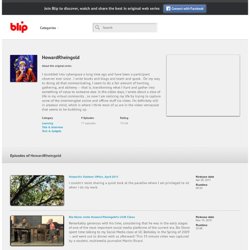
Howard Rheingold. M2 Editions - Foules Intelligentes - Howard Rheingold. How to Thrive Online. Howard Rheingold Trending. 21st century media literacies. Howard Rheingold on the new digital divide - cccc's posterous. Howard Rheingold on collaboration. Hrheingold. City Brights: Howard Rheingold. “Every man should have a built-in automatic crap detector operating inside him.”
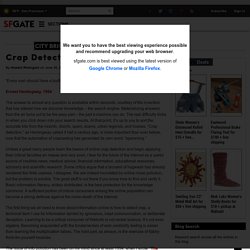
Ernest Hemingway, 1954 The answer to almost any question is available within seconds, courtesy of the invention that has altered how we discover knowledge – the search engine. Materializing answers from the air turns out to be the easy part – the part a machine can do. The real difficulty kicks in when you click down into your search results. Mini-course on Crap Detection - howardrheingold's posterous. Howard Rheingold (hrheingold) Howard Rheingold. Howard Rheingold. City Brights: Howard Rheingold. City Brights: Howard Rheingold. Will our grandchildren grow up knowing how to pluck the answer to any question out of the air, summon their social networks to assist them personally or professionally, organize political movements and markets online?
Will they collaborate to solve problems, participate in online discussions as a form of civic engagement, share and teach and learn to their benefit and that of everyone else? Or will they grow up knowing that the online world is a bewildering puzzle to which they have few clues, a dangerous neighborhood where their identities can be stolen, a morass of spam and porn, misinformation and disinformation, urban legends, hoaxes, and scams? I have collected evidence over the past several decades that suggests the humanity or toxicity of next year’s digital culture depends to a very large degree on what we know, learn, and teach each other about how to use the one billion Internet accounts and four billion mobile phones available today.
Mindful Infotention: Dashboards, Radars, Filters. Infotention is a word I came up with to describe the psycho-social-techno skill/tools we all need to find our way online today, a mind-machine combination of brain-powered attention skills with computer-powered information filters. The inside and outside of infotention work best together: Honing the mental ability to deploy the form of attention appropriate for each moment is an essential internal skill for people who want to find, direct, and manage streams of relevant information by using online media knowledgeably.Knowing how to put together intelligence dashboards, news radars, and information filters from online tools like persistent search and RSS is the external technical component of information literacy. Knowing what to pay attention to is a cognitive skill that steers and focuses the technical knowledge of how to find information worth your attention.
The overall system I’m seeking to understand is one of mindful infotention.